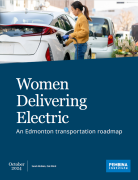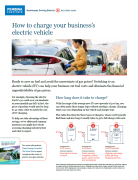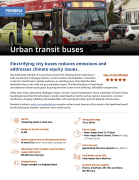As the world shifts towards cleaner economies, the vehicles we drive will be at the forefront of that transition. With transportation being the second largest source of emissions in Canada, one of the most effective things we can do is transition to electric vehicles (EVs). Through our work with Women in Fleet Transformation, we are not only leading efforts toward more environmentally sustainable business practices but also supporting the women running those businesses.
Women in Fleet Transformation
Powering businesses with electric vehicles

Women-owned businesses make up 17.5 per cent of all Canadian business, many of which rely on vehicles or fleets to transport goods, services, equipment and people. Photo: iStock/JGalione
The need for equitable solutions
Our research focuses on engaging women and gender-diverse entrepreneurs to uncover the specific barriers these enterprises face and develop customized solutions that promote an equitable transition to zero-emission vehicles (ZEVs).
Often overlooked in discussions about potential solutions, small- and medium-sized enterprises (SMEs) require targeted support to navigate this transition due to pronounced financial and capacity-related barriers. By including diverse groups in these discussions, we ensure their needs are addressed in the broader conversation about sustainable transportation and the shift towards a clean transportation future.
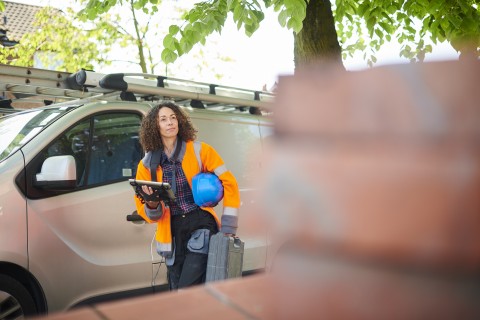
Understanding barriers and the pathways forward
While most SMEs have heard about ZEVs, many have not yet considered purchasing one. Hesitancy often stems from concerns regarding access to affordable models, the availability of charging infrastructure, the need for clarity about potential cost savings of owning one and certainty that the vehicle would be reliable.
To lower these barriers, measures identified by SMEs include financial incentives, such as tax benefits, grants or subsidies, which can help offset the high initial costs of ZEVs. Expanding charging infrastructure and prioritizing installation along business routes will enhance accessibility. And education and support programs tailored to small business owners can provide resources and information through government websites and direct outreach.
Discover the barriers, proposed solutions and our recommendations in the complete report. Explore how other jurisdictions are contributing to solutions in this area.

Our recommendations
Our recommendations are based on jurisdictional scans and interviews that uncovered cautious interest in ZEV adoption among women business owners, tempered by substantial barriers related to cost, infrastructure and technological uncertainty. To foster ZEV adoption in businesses that rely on transportation, it is essential to address these challenges through targeted policy interventions, including financial incentives, infrastructure development and education.
Each recommendation includes key implementation steps and considerations. By aligning policy efforts with industry-specific needs and fostering collaborative partnerships, we can create a more resilient and environmentally friendly transportation ecosystem.
Refer to Section 4, Table 2, in Women Delivering Electric for detailed recommendations.

Conversation on an inclusive ZEV transition
In a webinar on the topic of an equitable transition to ZEVs, experts discussed the barriers faced by diverse groups and shared learnings from engagement efforts and programs deployed to foster inclusive ZEV adoption.
Watch the recorded session to hear about strategies and perspectives that can inform the ongoing conversation around ZEV adoption.
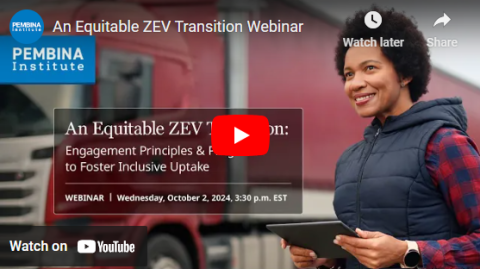
Contact our transportation team

Program Director
Adam Thorn
c: 416-859-4108
e: adamt@pembina.org
Media Contact
Lejla Latifovic (Eastern Time)
c: 819-639-4185
e: lejlal@pembina.org
Get our Pembina Perspectives
Pembina Perspectives provides thoughtful, evidence-based research and analysis to support action on climate — in your inbox every two weeks.
We endeavour to protect your confidentiality; read our full privacy policy.
